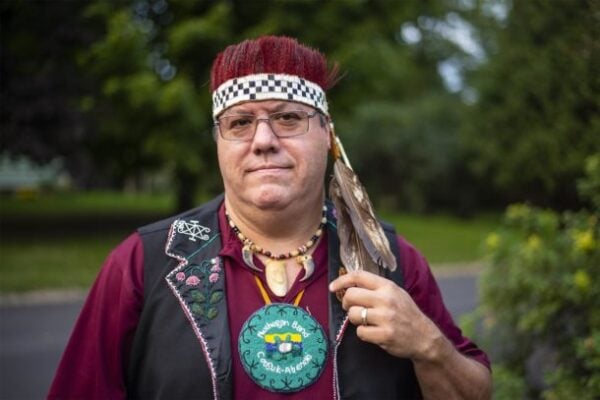


On July 4th, a day when millions of Americans were celebrating freedom, family, and fireworks, Ben & Jerry’s, the woke upmarket ice cream company, took a different route.
The company sent out a tweet condemning the U.S. for existing on “stolen Indigenous land.”
“This 4th of July, it’s high time we recognize that the US exists on stolen Indigenous land and commit to returning it,” the tweet from Ben & Jerry’s read.
 Chief Don Stevens of the Nulhegan band of the Abenaki nation at home in Shelburne on Tuesday, September 15, 2020. Photo by Glenn Russell/VTDigger
Chief Don Stevens of the Nulhegan band of the Abenaki nation at home in Shelburne on Tuesday, September 15, 2020. Photo by Glenn Russell/VTDigger
Yet, in a twist of irony that could make even the most avant-garde flavor combinations blush, the ice cream mogul soon found themselves on the receiving end of the very accusation they had cast on America.
Don Stevens, Chief of the Nulhegan Band of The Coosuk Abenaki Nation – a recognized tribe in Vermont – has called out the hypocrisy of Ben & Jerry’s statement.
In an interview with New York Post, Stevens revealed he’s open to discussing how the brand might better serve Indigenous peoples. Perhaps, he suggested, this conversation could begin with an examination of the company’s own headquarters. Located at 30 Community Dr. in South Burlington, Vermont, the office sits on what is historically Western Abanaki land.
“If you look at the [Abenaki] traditional way of being, we are place-based people. Before recognized tribes in the state, we were the ones who were in this place,” said Stevens.
“If the ice cream maker is ‘sincere,’ it should reach out to me,” he said, highlighting the irony of their social advocacy posturing.
“We are always interested in reclaiming the stewardship of our lands throughout our traditional territories and providing opportunities to uplift our communities,” Stevens told Newsweek.
“”If and when we are approached, many conversations and discussions will need to take place to determine the best path forward for all involved,” he added.
The New York Post reported that Unilever, the parent company of Ben & Jerry’s, has experienced a drop in stock price and market capitalization following the absurd tweet.
By Thursday, two days after the woke tweet, Unilever’s stock price had fallen 1.9 percent for a corresponding market cap loss of $1.7 billion.
